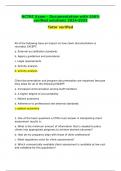Nctrc e - Study guides, Class notes & Summaries
Looking for the best study guides, study notes and summaries about Nctrc e? On this page you'll find 543 study documents about Nctrc e.
Page 4 out of 543 results
Sort by
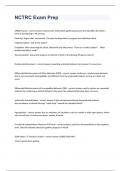
-
NCTRC Exam Prep Question and answers 100% correct
- Exam (elaborations) • 18 pages • 2024
- Available in package deal
-
- $13.49
- + learn more
NCTRC Exam Prep Question and answers 100% correct NCTRC Exam Prep APIED Process - correct answer Assessment: information gathering process that identifies the client's level of functioning in TR services. Planning: Begins after assessment. Can plan for department, program and individual client. Implementation: "put it into action!" Evaluation: After observing the client, determine any take aways. "How can I make it better? .. What worked and didn't work?" Documentation: Document...
NCTRC Exam – Documentation-with 100% verified solutions
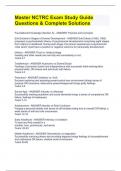
-
Master NCTRC Exam Study Guide Questions & Complete Solutions
- Exam (elaborations) • 16 pages • 2024
- Available in package deal
-
- $12.99
- + learn more
Foundational Knowledge (Section A) - ANSWER Theories and Concepts Erik Erickson's Stages of Human Development - ANSWER Erik Erikson (1950, 1963) proposed a psychoanalytic theory of psychosocial development comprising eight stages from infancy to adulthood. During each stage, the person experiences a psychosocial crisis which could have a positive or negative outcome for personality development. Infancy - ANSWER Trust vs. mistrust stage Feeding and other needs are met fully and consisten...
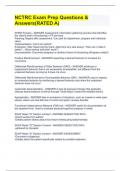
-
NCTRC Exam Prep Questions & Answers(RATED A)
- Exam (elaborations) • 13 pages • 2024
- Available in package deal
-
- $12.99
- + learn more
Differential Reinforcement of Other Behavior (DRO) - ANSWER reinforces a replacement behavior that is not necessarily incompatible, but different from the undesired behavior as long as it
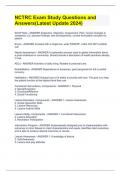
-
NCTRC Exam Study Questions and Answers(Latest Update 2024)
- Exam (elaborations) • 26 pages • 2024
- Available in package deal
-
- $12.99
- + learn more
NCTRC Exam Study Questions and AnswerSOAP Note - ANSWER Subjective, Objective, Assessment, Plan. Covers changes in symptoms, c/o, physical findings, new developments, current formulation and plan for patient. Errors - ANSWER Crossed with a single line, write "ERROR", initial. DO NOT scribble out! Needs Assessment - ANSWER A systematic process used to gather information about a given individual or community. Should include a description of health practices already in use. ADLs - ANSWER...
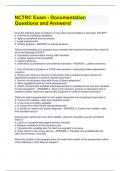
-
NCTRC Exam - Documentation Questions and Answers!
- Exam (elaborations) • 18 pages • 2024
- Available in package deal
-
- $11.49
- + learn more
NCTRC Exam - Documentation Questions and Ans Client documentation and program documentation are important because they allow for all of the following EXCEPT: wers! All of the following have an impact on how client documentation is recorded, EXCEPT: a. External accreditation standards b. Agency guidelines and procedures c. Legal requirements d. Activity analysis - ANSWER d. activity analysis Client documentation and program documentation are important because they allow for all of the f...

-
NCTRC Exam|| 450 Sample Questions|| Accurate Answers|| Verified
- Exam (elaborations) • 37 pages • 2024
- Available in package deal
-
- $13.99
- + learn more
NCTRC Exam|| 450 Sample Questions|| Accurate Answers|| Verified During an initial assessment, a client shows little facial expression or is very slow to show expressions. How would the CTRS document this client's affect? - ANSWER Blunted Which of the following is NOT an essential outcome of rehabilitation therapy for pediatric clients? - ANSWER Reduced cost of care According to Havighurst's Theory of Adult Development, which of the following best characterizes middle age? - ANSWER Ac...
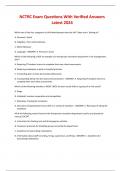
-
NCTRC Exam Questions With Verified Answers Latest 2024
- Exam (elaborations) • 23 pages • 2024
-
- $17.99
- + learn more
NCTRC Exam Questions With Verified Answers Latest 2024NCTRC Exam Questions With Verified Answers Latest 2024NCTRC Exam Questions With Verified Answers Latest 2024NCTRC Exam Questions With Verified Answers Latest 2024NCTRC Exam Questions With Verified Answers Latest 2024NCTRC Exam Questions With Verified Answers Latest 2024NCTRC Exam Questions With Verified Answers Latest 2024NCTRC Exam Questions With Verified Answers Latest 2024NCTRC Exam Questions With Verified Answers Latest 2024NCTRC Exam Que...
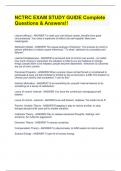
-
NCTRC EXAM STUDY GUIDE Complete Questions & Answers!!
- Exam (elaborations) • 13 pages • 2024
- Available in package deal
-
- $12.99
- + learn more
Leisure efficacy - ANSWER To meet your own leisure needs, benefits from good circumstances. You need a repertoire of skills to be self-capable. Meet own needs/goals. Attribution Model - ANSWER The causal analysis of behavior. The process by which a person attributes or makes causal inferences. "To what I attribute my successes and failures". Learned Helplessness - ANSWER A perceived lack of control over events. -no matter how much energy is expended, the situation is futile & you are hel...
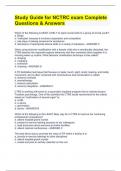
-
Study Guide for NCTRC exam Complete Questions & Answers
- Exam (elaborations) • 14 pages • 2024
- Available in package deal
-
- $12.49
- + learn more
Which of the following is MOST LIKELY to teach social skills to a group of at-risk youth? a. Bingo b. Volleyball, because it involves cooperation and competition c. role plays of asking someone for assistance d. discussion of appropriate leisure skills in a variety of situations - ANSWER C When using behavior modification with a female child who is emotionally disturbed, the CTRS teaches her separate hygiene behaviors and then combines them together in a morning wake up routine. What beha...

$6.50 for your textbook summary multiplied by 100 fellow students... Do the math: that's a lot of money! Don't be a thief of your own wallet and start uploading yours now. Discover all about earning on Stuvia

